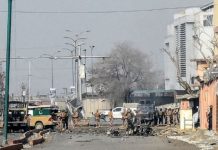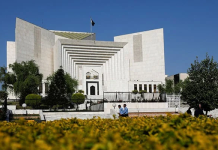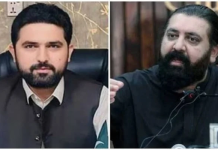ISLAMABAD, Jun 20 (DNA): Former chief justice of Pakistan (CJP) Jawwad S
Khawaja has challenged the trial of civilians in military courts in
Supreme Court of Pakistan, demanding to declare the move
‘unconstitutional’.
According to details, ex-CJP Jawwad Khawaja filed a petition in the
Supreme Court of Pakistan and demanded to declare the trial of civilians
in military courts ‘unconstitutional’.
The petition named the Federation of Pakistan through secretaries of law
and justice, interior, defence, and chief secretaries of Punjab, Khyber
Pakhtunkhwa, Sindh and Balochistan as respondents in the case.
CJP Jawwad Khawaja, in his plea, maintained that the trial of civilians
by military courts in the presence of civilian ones is unconstitutional.
The plea contended that proceedings of a court martial were only
appropriate and lawful in the case of army officers.
The plea demanded to declare “any proceedings against civilians on the
basis of the impugned sections unlawful”. It prayed the court should
direct that such civilians be transferred to the competent civilian
authorities for appropriate proceedings before ordinary criminal courts.
The petition came after Chaudhry Aitzaz Ahsan filed a similar petition
in the Supreme Court, challenging the trials of civilians in military
courts.
Aitzaz Ahsan has petitioned to the apex court to declare the federal
government’s decision to conduct trials in military court as null and
void.
“The federal government has rubber stamped the corps commanders’
decision of conducting trials in the military court,” text of the
petition read.
“The decision of holding military court trial of civilians under Section
2 of the Army Act has been in contravention to Article 59 of the
constitution,” according to the plea.
Petition argued that Section 94 of the Army Act and the rules of 1970
are incomparable and pleaded the court to declare Section 94 and the
rules as unconstitutional.
Last month, the government decided to try the suspects accused of
attacking military installations on May 9 under army laws.
Violent clashes broke out across Pakistan after the former prime
minister and Pakistan Tehreek-e-Insaf chief Imran Khan was arrested from
the premises of the Islamabad High Court (IHC) on May 9.
The protests were held in remote and major cities as the party workers
were agitated due to their chairman’s arrest, with Balochistan, Punjab,
Khyber Pakhtunkhwa, and Islamabad summoning the armed forces to ensure
law and order.
Army installations, Corps Commander’s house in Lahore and General
Headquarters (GHQ) in Rawalpindi came under attack during a protest by
PTI workers.
So far, a Lahore anti-terrorism court has sanctioned the handing over of
16 May 9 suspects to the military and a Rawalpindi court has approved
the handing over of another eight suspects.
The Pakistan Army Act (PAA), 1952, and Official Secrets Act, 1923 allow
trying civilians in military courts only in narrowly defined
circumstances, including for inciting mutiny, spying, and taking
photographs of “prohibited” places.

















